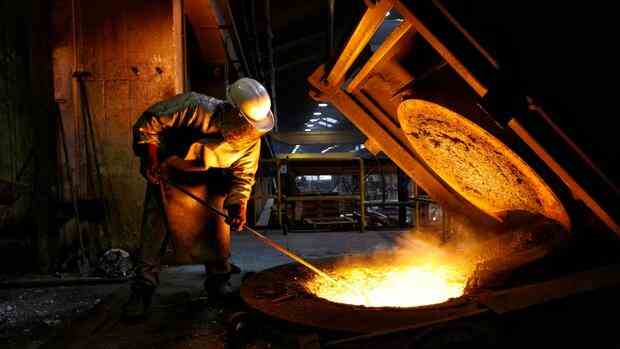Climate protection agreements serve the purpose of enabling the transformation to climate neutrality – for example in the steel industry.
(Photo: imago images/imagebroker)
Duisburg Industrial companies with a large carbon footprint face enormous challenges. They have to make their processes climate-neutral and are dependent on the help of the state. Federal Minister of Economics Robert Habeck (Greens) has promised massive support. However, the circle of those entitled to claim will initially be very small, with the focus being on the steel industry.
This is now triggering criticism, for example from the Association of German Chambers of Industry and Commerce (DIHK): “The funding must not be limited to a few branches of industry and large-scale processes, as has unfortunately been planned so far. Anyone who wants to promote climate-neutral processes must also keep an eye on medium-sized companies,” said Achim Dercks, Deputy General Manager of the DIHK, the Handelsblatt. Because they are important drivers in Germany on the way to climate neutrality.
At the end of last year, Habeck’s plans became public. They are reflected in the draft of a “Guideline for the promotion of climate-neutral production processes in industry through climate protection agreements”. Addressees are “emission-intensive industrial sectors”.
These include steel and cement. The draft states that climate-friendly production is often so cost-intensive that “companies cannot switch to it because otherwise they would have too great a cost disadvantage in competition”.
Top jobs of the day
Find the best jobs now and
be notified by email.
This is the point where future climate protection agreements that are concluded between the public sector and individual companies should come into play. The principle: On the basis of these contracts, companies from energy-intensive industrial sectors are compensated for the additional costs that the corporations incur as a result of the fact that they set up and operate more climate-friendly alternatives compared to conventional plants.
Contracts are to be concluded as early as the beginning of 2023
The climate protection agreements are to have a term of 15 years. The ministry wants to “make a two-digit billion amount available for climate protection contracts so that energy-intensive industry can produce in a climate-friendly manner”. The first contracts are expected to be signed in early 2023.
>> Read here: Under decarbonization pressure: The steel industry must quickly become climate-neutral
In the eyes of DIHK Managing Director Dercks, the climate protection agreements are a “fundamentally good instrument” for promoting climate-friendly production processes. However, the contracts would have to “be able to have an effect across the economy”.
The reason behind the restriction of the group of addressees is that, in a first step, one wants to bring about large CO2 reductions with a few contractual partners. For example, the steel industry in Germany alone accounts for 30 percent of industrial CO2 emissions and six percent of total CO2 emissions.
In a statement by the DIHK on the draft of the funding guideline, it now says that the climate protection agreements should be extended to other activities, such as vehicle construction.
In principle, the contracts should be available to all companies “if they use innovative, cost-intensive production technologies and have no chance against emission-intensive marketable technologies without funding on the European or international market”.
Experts: Funding should be accessible to all companies
Experts like Frank Peter, Industry Director at the Agora Energiewende think tank, agree. “Climate protection agreements are a transformation tool. They should therefore be open to all companies that have to bear the additional costs of converting their production processes to long-term climate-neutral technologies.” The think tank has been dealing with the subject of contracts for differences for years.
The DIHK is convinced that another point needs to be examined: the planned term of the contracts of 15 years. This long funding period could quickly become a hurdle: “Because it ties companies to one technology for this time – more flexibility or an opening clause would be good here,” said Dercks.
Here, too, the DIHK receives support from Agora Energiewende: “Flexibility is needed in the terms of the climate protection contracts. Short funding periods make it possible to adapt technical innovations more quickly and create options for developing alternative marketing channels,” said Peter.
More: Endgame for German industry – three scenarios for the future

